by Lisa Cooke | Sep 30, 2016 | 01 What's New, Records & databases
Search through new and updated genealogical records and histories galore. We are covering the world this week, reaching places we haven’t touched on before. Search records from familiar collections in Canada and the U.S., then check out what’s new in Russia and Ghana.
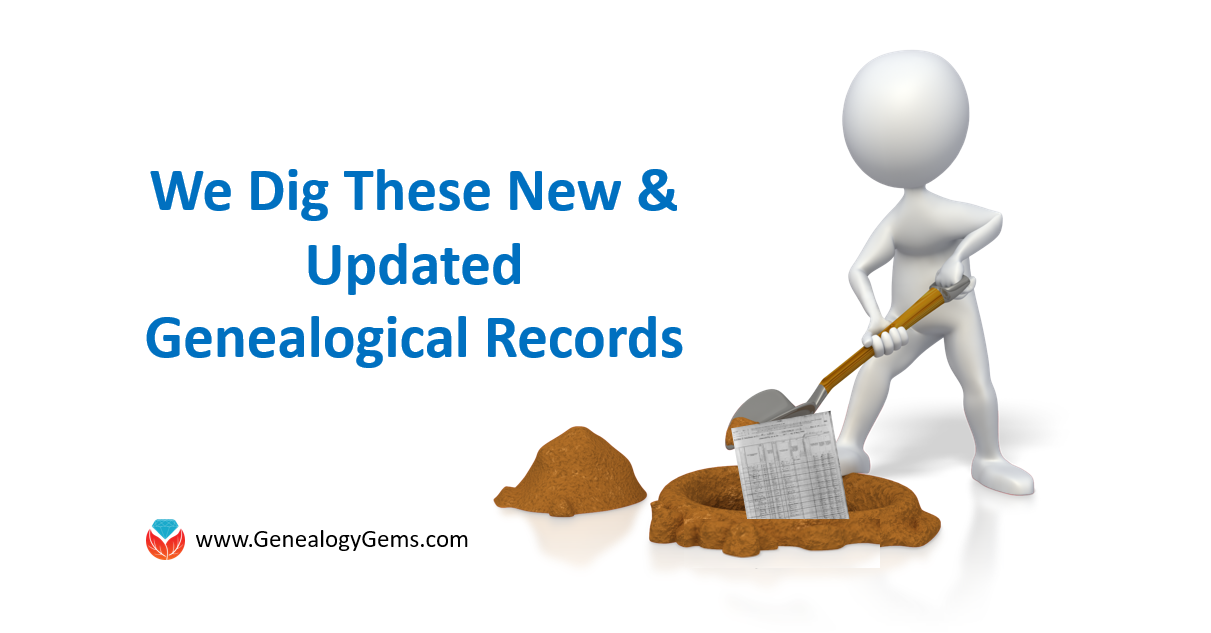
Canada – World War I
We know many of our readers have ancestry from Canada and we want to point your attention to the holdings at the Library and Archive Canada. This repository has many digital collections online and even includes a portrait portal with over 4 million images!

Today, we shine a light on just over 330,000 files now available online in the Soldiers of the First World War: 1914–1918 database.
The Soldiers of the First World War database is an index to the service files held by Library and Archives Canada for the soldiers, nurses, and chaplains who served with the CEF (Canadian Expeditionary Force.) Each box of service files holds approximately 50 files and envelopes. The individual’s name and service number or rank, if an officer, is written on each envelope. This database was organized by entering the name and number found on the outside of each of these file envelopes.
When the attestation papers and enlistment forms were digitized from the Attestation Registers (RG 9, II B8, volumes 1 to 654,) the images were linked to the database. Tip: When searching by name, be sure to look for alternate spellings as well.
The original paper documents can no longer be consulted, so your only option is to view these records digitally. For those items not yet digitized, you can order a copy from the Archives. As we mentioned, not all the documents have been digitized, but are are being done so regularly. Check back often!
United States – State and Local Histories
Findmypast has updated their United States, State & Local Histories collection and now holds 332 digitized books of state and local histories in PDF format. These histories come from Connecticut, Illinois, Indiana, Iowa, Maine, Massachusetts, Michigan, Nebraska, New Hampshire, New Jersey, New York, North Carolina, Ohio, Oregon, Pennsylvania, Rhode Island, South Carolina, Tennessee, Texas, Vermont, Virginia, Washington, Washington D.C., West Virginia, and Wisconsin.
You can narrow your specific search by publication year, title, county, and state, or search by keywords. These books often add clues and hints to the lives of our ancestors. You may also come across a biographical sketch of your ancestor which may hold key information you have been looking for.
Additionally, a sister collection titled United States, Family Histories may also prove fruitful. This collection contains over 930,000 images taken from 3,926 family histories and genealogies from all 50 states and several locations overseas. These PDF records can be searched by publication year, title, county, and state, page number, and key words. The publications emphasize tracing the descendants of the early, colonial immigrants to the United States. If you have a targeted ancestor that falls into that category, you will want to check these histories thoroughly.
United States – New York – Histories
The New York Genealogical and Biographical Record is the second oldest genealogical journal in the U.S. This week, Volume 27, Issue 2 (January 2016) of this publication is available at Findmypast. You can search or browse to find possible hints and clues to aid you in your research.
The New York Genealogical and Biographical Record is a quarterly publication, published since 1870. It publishes compiled genealogies that are documented, transcriptions of original records, and much more. To further learn about the NYG&B and their society, click here.
You might also be interested in the NYG&B’s quarterly review titled The New York Researcher. Formerly known as the NYG&B Newsletter, The New York Researcher has been published since 1970. Volume 147, Issue 2 (Summer 2016) of this publication is available now at Findmypast.
You will enjoy instructive articles on genealogical research techniques and New York resources, profiles of repositories, and profiles of genealogical societies across the State of New York.
Russia – Church Records
FamilySearch has digitized more than 2 million records in their collection titled Russia, Tatarstan Church Books, 1721-1939. Though these records are not indexed yet, you may find images of births and baptisms, marriages, deaths, and burials performed by priests of the Russian Orthodox Church in the republic of Tatarstan. These records were acquired from the state archive in that province.
Places are identified by their historical name and jurisdiction when it was part of the Russian Empire. If you are unsure of the history of your targeted location, remember what our Google Guru Lisa says…”Just Google It!”
The collection covers records from 1721 to 1939. These records are written in Russian, but remember that FamilySearch offers a helpful cheat sheet of common words and their translations!
There may be some restrictions on viewing these records. Whenever possible, FamilySearch makes images available for all users. However, rights to view images on their website are granted by the record custodians. In this case, the Russia, Tatarstan Church Books, 1721-1939 images can be only be viewed online at a Family History Center near you, or the Family History Library.
Ghana – Census
FamilySearch has also added the Ghana Census, 1984. This population census for Ghana is a complete enumeration of the 12.3 million people residing in Ghana as of midnight March 11, 1984. The census is divided into 56,170 localities. According to the government of Ghana, a locality is defined as any “nucleated and physically distinct settlement.” Localities may include a single house, a hamlet, a village, town or city. In some areas of the Upper West and Upper East Regions, these localities are based on kinship groups. Only those individuals, including foreign visitors, who were present in Ghana on March 11, 1984, were included in this census.
There have been some records lost in Ghana and so not all localities are available. Important: Be aware that the printed date on the census enumeration form usually says 1982, but this census was formally conducted in 1984.
The 1984 Ghana census may hold the following information:
- Detailed address of
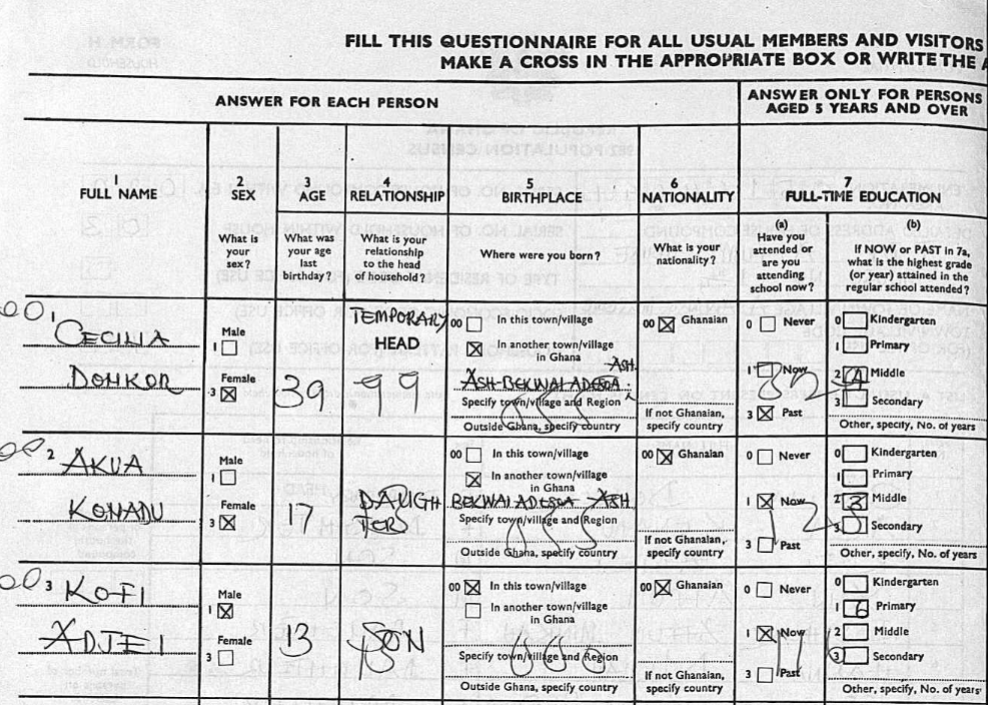 the house
the house
- Name of town/village
- Full name of members present on census night
- Relationship to head of household
- Gender, age, birthpla
ce, and nationality of each individual
- Level of education
- Occupation
- Employment status
- Names of visitors on census night
- Names of members absent on census night
by Lisa Cooke | Sep 29, 2016 | 01 What's New, Conferences
Texas State Genealogical Society Conference 2016 is coming up next month and there is still time to register! Learn from some of the elite genealogists in the field, including our own Lisa Louise Cooke.

Pre-Conference Research Day
The Texas State Genealogical Society (TSGS) Conference begins on the 27th of October with the Pre-Conference Research Day. This free research day is being hosted by the Dallas Public Library and the Dallas Genealogical Society.
Held at the Dallas Public Library from 10 am to 8 pm, this research day will include:
- Staff-led tours available of the Genealogy Division (8th floor), the Dallas History & Archives (7th floor), and the Government Documents Division (6th floor);
- Volunteers on hand to assist people with research and Texas Heritage Certificate applications;
- and light refreshments to be served.
The Texas State Genealogical Society Conference 2016
This year’s conference venue will be the beautiful Crowne Plaza in downtown Dallas. You can really get excited for this three-day conference packed with 70 sessions and 35 speakers. The TSGS hopes to provide something for every genealogist. The conference will also include special afternoon breakout sessions and five in-depth workshops among the noted activities. An exhibit hall packed with the latest and greatest from genealogy companies and researchers will be enticing and Genealogy Gems will be there, so don’t forget to stop by and see us!
Lisa’s Sessions at the Conference
Lisa will be presenting a class titled Beginning Evernote for Genealogists on Friday. You will gain a firm grasp of what Evernote can do and how to get started. Best of all, learn how easy it is to put all your genealogical research notes (text, audio, images, etc.) into Evernote and to have it at your fingertips with super fast note retrieval.
On Sunday, Lisa will present Using Google Earth for Genealogy. In this popular class, Lisa (our Google Guru!) will teach you how to unlock the mysteries in your research from unidentified photographs, to how an ancestral location looked a hundred years ago. You will be amazed to discover how Google Earth is one of the best free genealogical tools available today.
Register for the Texas State Genealogical Society Conference 2016
If you haven’t already done so, there is still time to register. Early bird registration is available through October the 7th. See all the price options and register by clicking here: http://www.txsgs.org/conference/registration/
We hope to see many of you there. Don’t forget to stop by and see us in the exhibit hall to share with us what you have learned!
To see where Lisa will be teaching next, see our seminar page here.
More Gems for E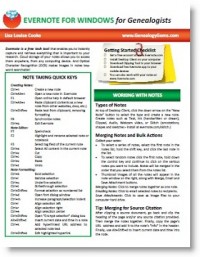 vernote
vernote
Get started using Evernote even before Lisa’s class on Oct. 28, 2016. Our quick reference guides make it easy!
Evernote for Windows for Genealogists Guide
Evernote for Mac for Genealogists Guide
by Lisa Cooke | Sep 28, 2016 | 01 What's New, Beginner, Organization, Premium Video
Getting genealogy organized is just one of the topics we cover here at Genealogy Gems, and Premium Members have exclusive access to podcast and video content to help you accomplish that goal.
We’ve put together a step-by-step plan for getting the most out of Premium Membership, and going from unorganized to organized in nothing flat!
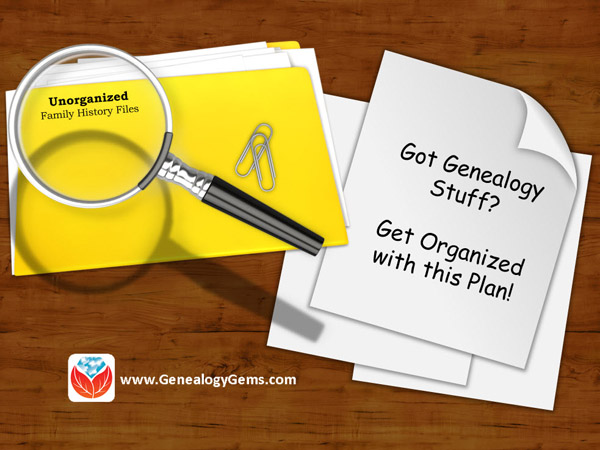
A new Gem’s reader recently sent us the following email:
Dear Lisa,
I have recently joined Genealogy Gems as a Premium member and wanted to ask if there is a good place to get started.
I have a ton of family information collected, but as yet have not figured out a plan of attack.
I was wondering if you could guide me in which podcasts, premium podcasts, and videos would be good ones to start with. I need to put this information into some semblance of order so that I can move constructively on it, as well as to be able to share the family history with others and have it make sense. Thanks, Gerri.
Getting Genealogy Organized with Premium Content
We are so glad to have you as a Genealogy Gems Premium Member. Welcome!

The best place to start is by digging into these blog posts that I highly recommend:
When you are ready to move onto the Premium Podcast episodes, I suggest you focus first on:
- Hard Drive Organization Part 1 and Part 2
- Use Evernote to Create a Research Plan
- Podcast episode 114: Paper Organization
- Family History: Genealogy Made Easy Podcast episodes 31 & 32: Organizing Your Genealogy Files.
Getting genealogy organized is one of the most overwhelming tasks new and seasoned genealogists deal with. Whether you’re new to Premium Membership or a long time member, make sure you have a solid basic structure for your genealogy organization, as it is the backbone of everything that follows. That basic structure for getting genealogy organized might look like this:
A Quick Plan for Getting Genealogy Organized
- Assess what you have.
- Pick a genealogy database software program. We recommend RootsMagic.
- Set-up a few 3-ring binders with acid free sheet protectors so you have a place to put documents and other important things.
- Set-up a basic folder and file structure for your hard drive based on the Premium videos Hard Drive Organization.
- Have a back-up plan for your precious family history files. We recommend BackBlaze as a way to automatically back-up your computer files.
- Sign-up for our free newsletter (if you haven’t already) to stay up-to-date on all the latest records and techniques.
- Don’t wait to be fully organized before you begin. Stay motivated by scheduling “fun” research time, as well as organization time.
- Make appointments with yourself to stay on track, and listen to the Genealogy Gems Premium Podcast while you organize.
- Regularly tap into all of the Genealogy Gems resources like what’s new in books and guides.
Like us on our Facebook page to see more genealogy ideas
Become a Genealogy Gems Premium Member
If you are not a Genealogy Gems Premium Member, take a look at what you are missing! Premium Members are able to listen to our Premium podcasts packed with even more tips and techniques for all things genealogy. You also have access to my most popular training videos.
BONUS e-book:
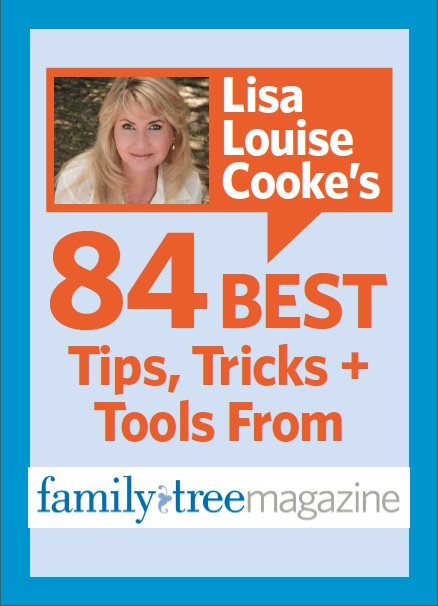 For a limited time, new members will receive
For a limited time, new members will receive
this exclusive digital PDF e-book,
a collection of my most popular
articles from Family Tree Magazine!
(the e-book will be emailed to you
within 24 hours of purchase)
by Lisa Cooke | Sep 26, 2016 | 01 What's New, RootsTech |
It’s that time of year again! RootsTech 2017 is officially open for registration.
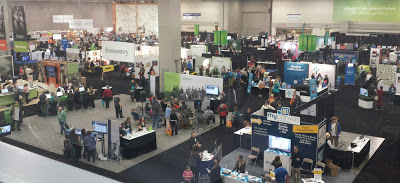
Each year, eager genealogists around the world excitedly wait to get the message that RootsTech registration is officially open. Well, here is your special announcement: As of September 15th, registration for RootsTech 2017 is now open!
What is RootsTech?
RootsTech is an annual family history and technology conference in Salt Lake City, Utah. Speakers and attendees from all over the globe descend on the Salt Lake Valley to learn and share innovative and new tools in genealogy.
In 2016, the event attracted more than 28,000 attendees in-person from all 50 US states and 30+ countries. RootsTech 2017 will be held February 8–11 at the Salt Palace Convention Center in Salt Lake City, Utah. The popular Innovator Summit and free Family Discovery Day are also open for registration. The website for registration can be found at RootsTech.org. Early bird pricing is $159.00, so don’t delay! Early bird discount pricing is available for a limited time on 4-day passes at just $159 and $189 for the RootsTech plus Innovator Summit pass. Passes for the Getting Started track start at $49 for a single day and $69 for a limited 3-day pass. All passes include access to the popular expo hall and morning keynote sessions.
The 4-day conference will offer over 200 lectures from top instructors in the field, including four of our Genealogy Gems team members, Lisa Louise Cooke, Sunny Morton, Amie Bowser Tennant, and Diahan Southard.
In addition to lectures, some hands-on computer labs and interactive activities can also be enjoyed.
Other Events at RootsTech 2017
RootsTech is for everyone, young and old. The expo hall and other entertainment events are just the beginning!
You and your entire family may enjoy Family Discovery Day. This event takes place on Saturday, February 11, 2017 and is designed for families and members of The Church of Jesus Christ of Latter-day Saints. This is a free and fun day event including messages from Church leaders, engaging classes for all ages, and evening entertainment. Family Discovery Day attendees will also have access to all the interactive activities and exhibitors in the RootsTech expo hall. Registration is required.
If you make it out to RootsTech in February, be sure to come by the booth and see us. As always, we have some really special things planned as we do a little celebrating of some of our Genealogy Gems milestones. Stay tuned!
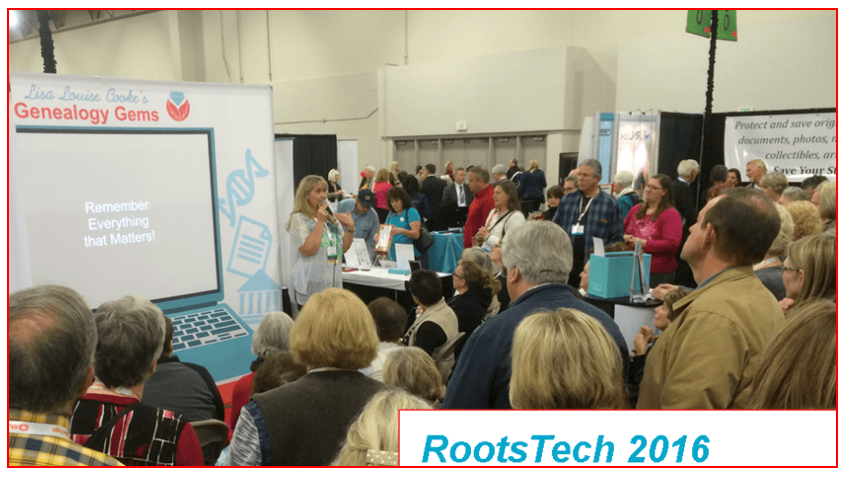

by Lisa Cooke | Sep 23, 2016 | 01 What's New, Irish, Records & databases
We are digging deep into these new and updated genealogical records this week. We begin with several genealogical records for Ireland and Scotland, then new additions in Argentina. To end our list, a couple of fun finds in Minnesota and the state of Washington!
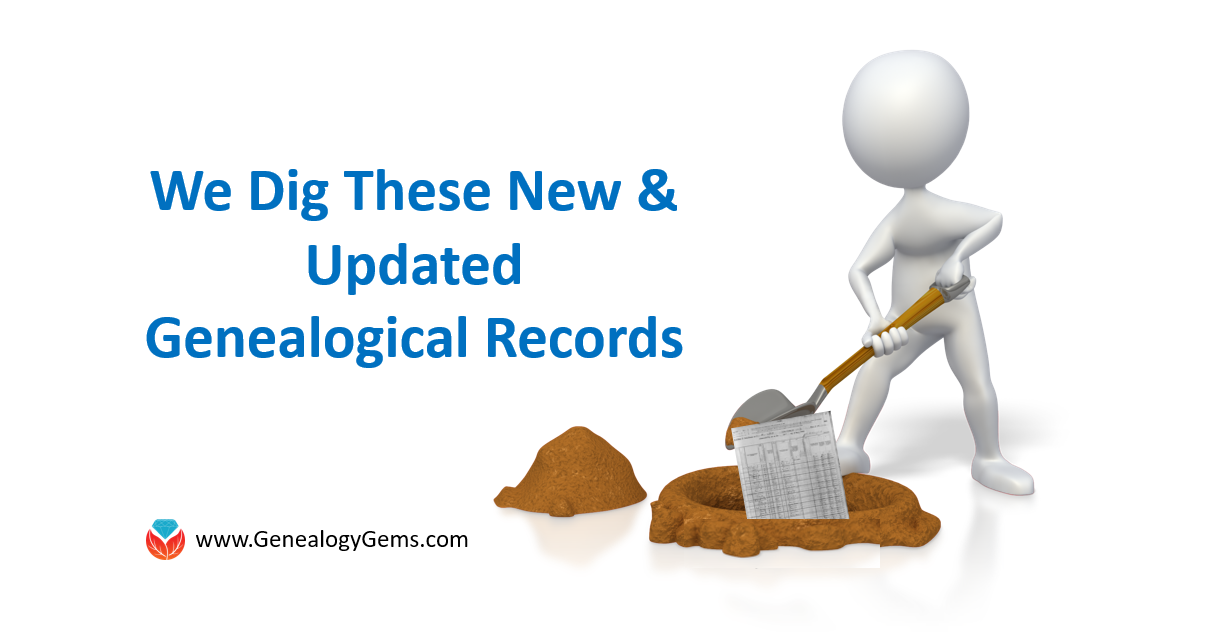
Ireland – Valuation Office Books
New collections have been added to Findmypast and the first is titled Ireland Valuation Office Books. With just under 2 million records, this collection contains several types of manuscript records including field books, house books, quarto books, rent books, survey books, and more.
Each record includes both a transcript and an image of the original document. The amount and type of information will vary depending on the date and nature of the document. Some book types, such as tenure books, include notations about the property as well as notes on the cost of rent and additional observations. House books include descriptions of the property. Quarto books include observations about the tenement.
Ireland – Will Registers
Also new at Findmypast, Ireland, Original Will Registers, 1858-1920 is a collection with over 181,000 records. These records are derived from district courts and held by the National Archives of Ireland. Wills from Northern Ireland are included, up until 1917. Each of the records contain a transcript and an image of the original source document.
Each transcript will provide you with a name, whether the person is heir, executor, or deceased, name of the deceased, and whether the document is a will, grant of probate, or an administration. From the images, you can determine dates, address of the parish, names of other heirs, and other various details.
The images provide much more detail about your ancestor’s will. Most entries have your ancestor’s death date, death place and who inherited the deceased person’s property, and processions. The will can provide the names of many other relations and explain their family connections.
Some wills are more than one page, so you will need to use the arrow on the right side of the image to continue reading the document.
Ireland – Church Records
Lastly, Findmypast has added the new collection titled Ireland, Catholic Qualification and Convert Rolls, 1701-1845. You can search lists of over 50,000 Irish Catholics who swore loyalty to the crown or converted to Protestantism. As a note of interest, Catholics were restricted from owning property or having businesses during the Penal Laws of the 18th century. Because of this, many chose to either convert to the Church of Ireland or swear loyalty to the crown so they qualified for certain rights.
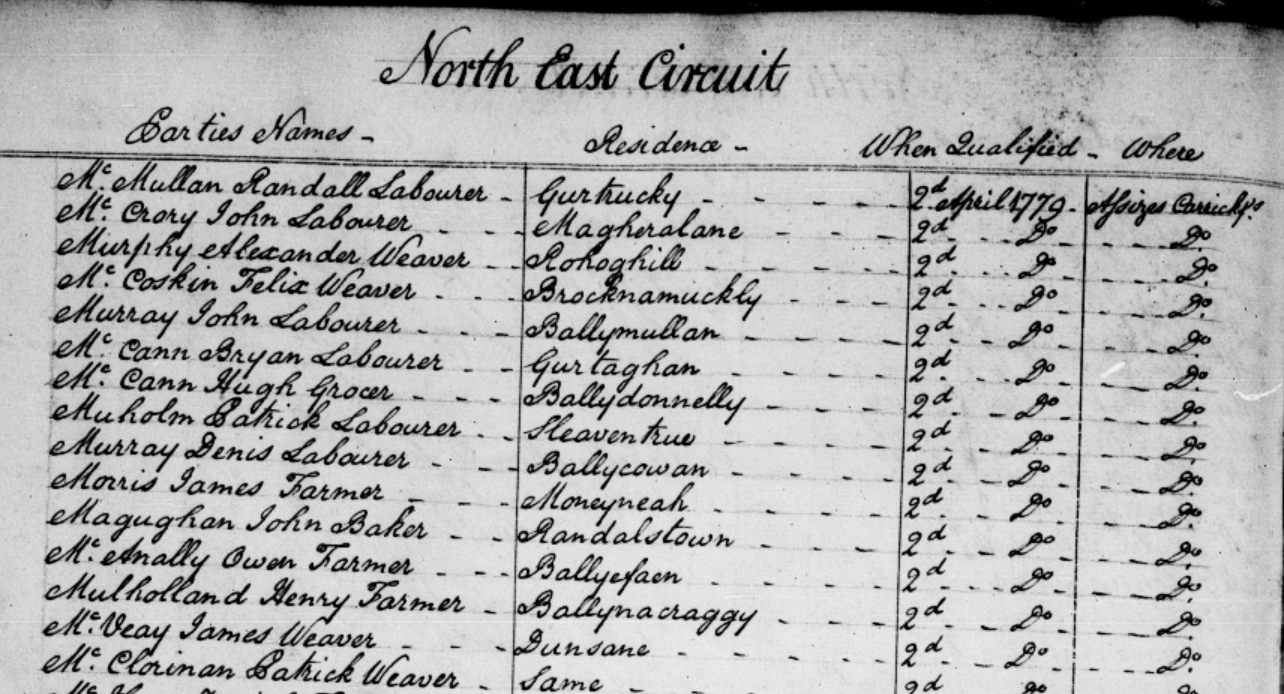
Each record contains a transcript and an image of the original entry. The amount of information varies, but you should be able to find a name, an address, occupation, date of conversion or qualification, date of enrollment or court hearing, and the court.
Glasgow – Electoral Registers
Ancestry has made available over 100 years of electoral registers from the Mithcell Library’s family history collection. These voter rolls have been digitized and can be found in the collection titled Glasgow, Lanarkshire, Scotland, Electoral Registers, 1857-1962.
Electoral registers may provide a name and place of residence, a description of property, and qualifications to vote. Registers were compiled at a local level, with names appearing alphabetically within the wards or districts. Many of the registers in this database have been indexed electronically, which allows you to search them by name, but if you’re searching for a somewhat common name it will be helpful to know the area in which your ancestor lived to narrow your results.
Remember: Parliamentary Division boundaries may have changed over time. If you are looking for a particular parish or place, try searching using the key word field rather than browsing the image sets listed by Division.
Korea – Various Records
Though these two new Korean database collections hold few records in number and they are browse-only at this time at FamilySearch, they are a wonderful step in the right direction. Korean records of genealogical value are not always easily found online. These new Korean collections include:
Korea, Local History, 655-1935 – A small collection of local histories and town records from Korea. The records are written in Korean using Chinese hanja characters. This collection will be published as images become available, so check back from time to time to see what’s new.
Korea, School Records, 1958 – Only 149 images are digitized at this time. We will be watching this closely and update you as new records become available.
In the meantime, see what other collections FamilySearch has for Korea by clicking here.
Argentina – Cordoba – Church Records
FamilySearch has also e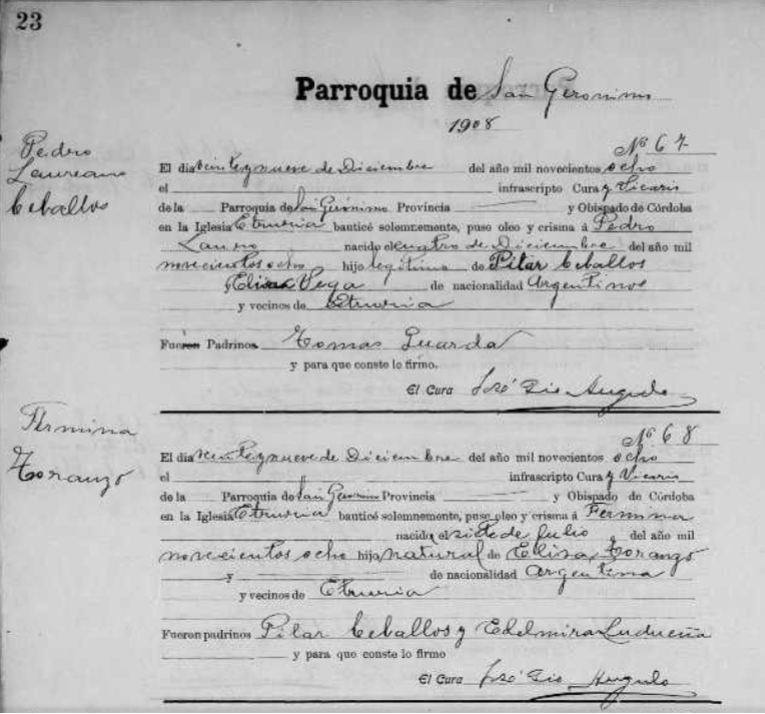 xpanded their Argentina Catholic Church Records in their collection titled Argentina, Cordoba, Catholic Church Records, 1557-1974. This collection nearly doubled with newly digitized and indexed records.
xpanded their Argentina Catholic Church Records in their collection titled Argentina, Cordoba, Catholic Church Records, 1557-1974. This collection nearly doubled with newly digitized and indexed records.
These records are in Spanish. This collection of church records includes baptism, confirmation, marriage, divorce, and death records for parishes in the Córdoba Province.
Catholic Church parish registers are a major record available to identify individuals, parents, and spouses before 1930. After this date, civil authorities began registering vital statistics, which by law included people of all religions.
United States – Washington – Marriage Records
Updated at Ancestry, Washington, Marriage Records, 1854-2013 contains both images and indexes extracted from various records of marriages in Washington.
Marriage records offer the basic facts such as bride, groom, date, and place. These images of marriage certificates may also include additional information such as:
- addresses
- ages
- race
- birthplaces
- occupations
- marital status (single, divorced)
- whether a first marriage
- fathers’ names and birthplaces
- mothers’ names, maiden names, and birthplaces
This database does not contain an image for every document included in the index.
United States – Washington – Naturalizations
Washington, Naturalizations, 1853-1980 database has been updated at Ancestry and contains records created as aliens applied for U.S. citizenship in the state of Washington. It includes both original records and an index extracted from naturalization documents. You will find:
- Certificates of Arrival
- Declarations on Intent
- Petitions for Naturalization
- Oaths of Allegiance
- Certificates of Naturalization
This database does not contain an image for every document included in the index.
Details contained on naturalization records varies based on the year. However, you may be able to find the following valuable information:
- name
- birth date
- country of origin
- arrival date
- place of arrival
- spouse
- children
- document type
- county
United States – Minnesota – Obituaries
FamilySearch expanded two large collections this week and one of those is the Minnesota, Obituaries, 1865-2006. Even though only about 73,000 records have been indexed, there are over 132,000 digital images in the browse-only section.
These obituaries include an index and images of newspaper obituary files filmed by FamilySearch at the historical societies in Minnesota. Indexed records and additional images will be added to this collection as they become available, so be sure to check back frequently.
Many of these digitized records are referred to as obituary cards, which means that the information has been abstracted from the original source. These cards usually contain the following information:
- Name of the deceased
- Age
- Death date
- Names of parents, spouse, children, siblings or other relatives
- Name of newspaper, date and place of publication
- Birth date and place
- Other details such as military service
We hope you enjoy the many new and updated genealogical record collections this week and that you make some new discoveries for your family tree. Don’t forget to share this post with your genealogy friends and help them in their research journey as well!


 the house
the house




 For a limited time, new members will receive
For a limited time, new members will receive




 xpanded their Argentina Catholic Church Records in their collection titled
xpanded their Argentina Catholic Church Records in their collection titled 


